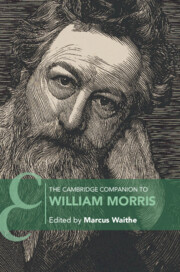Book contents
- The Cambridge Companion to William Morris
- The Cambridge Companion to William Morris
- Copyright page
- Dedication
- Contents
- Figures
- Notes on Contributors
- Acknowledgements
- Note on The Collected Works
- Chronology
- Abbreviations
- Introduction
- Part I Senses of Place
- Part II Authorship
- Chapter 5 Experimental Medievalism
- Chapter 6 Troubling the Heroic Ideal
- Chapter 7 Skaldic Morris
- Chapter 8 ‘The Whole Man’
- Chapter 9 Northern Epic
- Chapter 10 Utopian Fiction
- Chapter 11 Morris’s Prose Romances and the Origins of Fantasy
- Part III The Practical Arts
- Part IV Movements and Causes
- Part V Influences and Legacies
- Guide to Further Reading
- Index
- Cambridge Companions To …
Chapter 8 - ‘The Whole Man’
Morris’s Public Lectures
from Part II - Authorship
Published online by Cambridge University Press: 03 May 2024
- The Cambridge Companion to William Morris
- The Cambridge Companion to William Morris
- Copyright page
- Dedication
- Contents
- Figures
- Notes on Contributors
- Acknowledgements
- Note on The Collected Works
- Chronology
- Abbreviations
- Introduction
- Part I Senses of Place
- Part II Authorship
- Chapter 5 Experimental Medievalism
- Chapter 6 Troubling the Heroic Ideal
- Chapter 7 Skaldic Morris
- Chapter 8 ‘The Whole Man’
- Chapter 9 Northern Epic
- Chapter 10 Utopian Fiction
- Chapter 11 Morris’s Prose Romances and the Origins of Fantasy
- Part III The Practical Arts
- Part IV Movements and Causes
- Part V Influences and Legacies
- Guide to Further Reading
- Index
- Cambridge Companions To …
Summary
This chapter describes both the centrality of Morris’s work as a public lecturer and his feelings of ambivalence about speaking out in this way. It moves from Raymond Williams’s characterisation of the lectures as where Morris spoke as a ‘whole man’ to Thomas Carlyle’s mixed feelings about the form, poised as it was between conflicting ideas about preaching, about political life and about celebrity. It examines how Morris’s career as a lecturer was an aspect of his deepening engagement with public controversy from 1877, and was imagined as a duty that Morris was obliged to take up. It considers Morris’s resistance to rhetoric, which he connected to the deceiving modes of contemporary conventional politics. It argues that Morris’s own rhetoric was more compelling when he spoke at dramatic occasions, such as his Oxford lecture on ‘Art and Democracy’, rather than when he considered the lecture to be part of the grind of socialist agitation, where Morris sometimes worried about the capacities of his working-class audiences to understand his central message. The chapter ends by considering Morris’s speaking in Northumberland in 1887, as a temporary utopian moment when public speaking and the condition of the people were integrated and not separated.
- Type
- Chapter
- Information
- The Cambridge Companion to William Morris , pp. 111 - 121Publisher: Cambridge University PressPrint publication year: 2024

